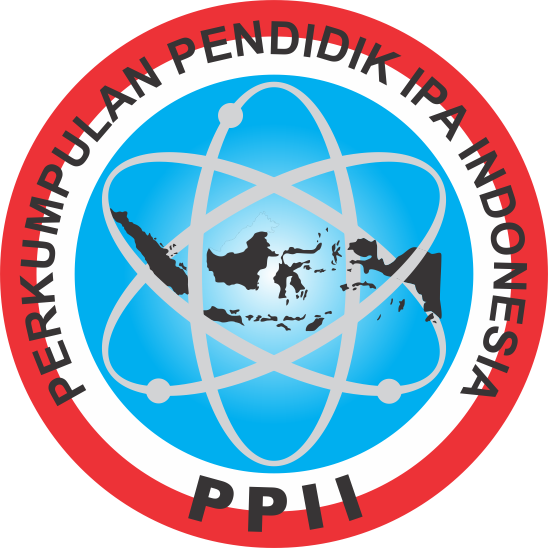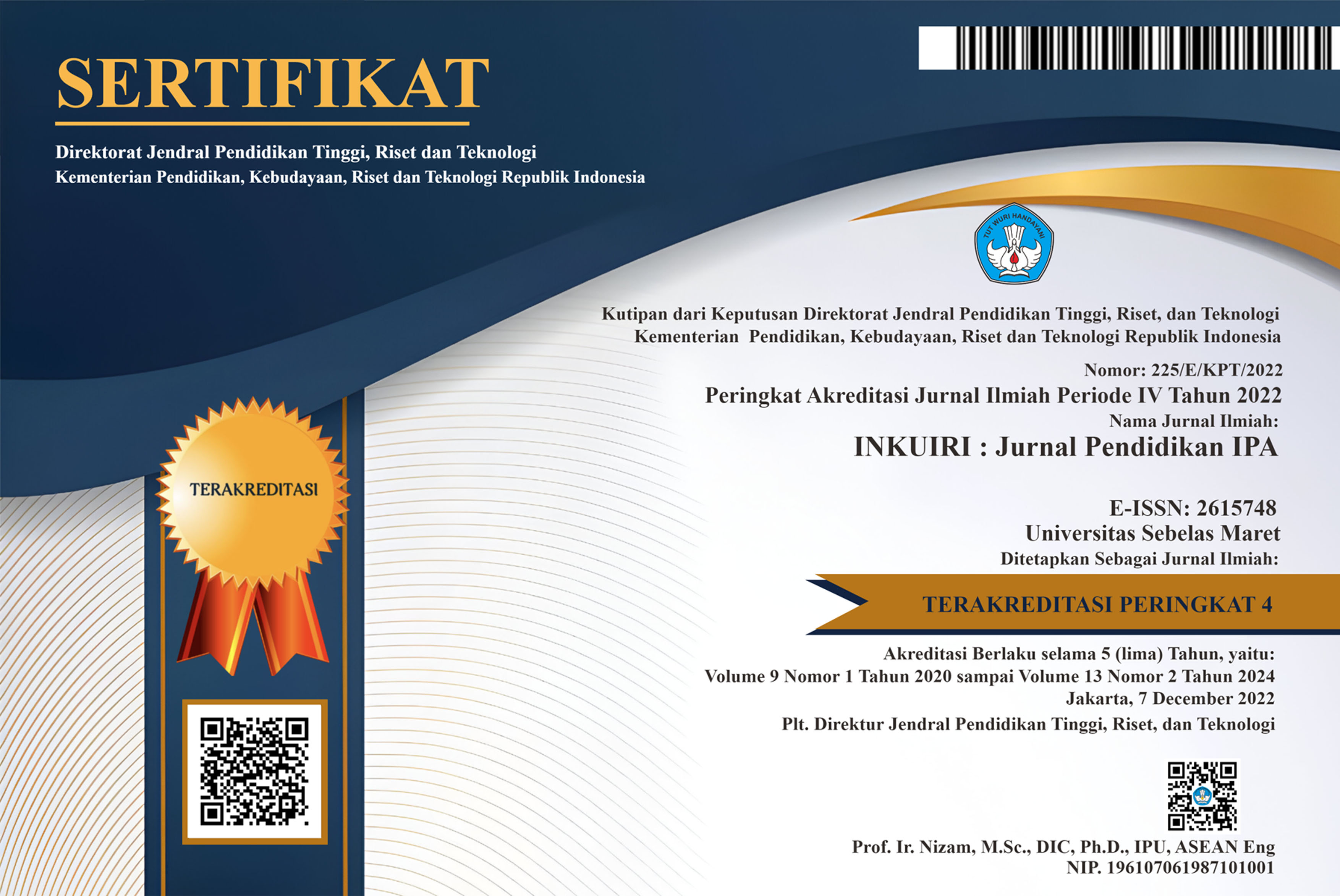Analisis Penerapan Model Pembelajaran Project Based Learning Terhadap Kemampuan Berpikir Kreatif Peserta Didik pada Mata Pelajaran Kimia
Abstract
Penulisan review artikel ini bertujuan untuk menelaah perbandingan antara teori-teori yang ada terhadap teori-teori sebelumnya dalam beberapa artikel penelitian, serta mengumpulkan data mengenai penerapan model pembelajaran Project Based Learning terhadap kemampuan berpikir kreatif peserta didik SMP, SMA, dan Mahasiswa pada mata pelajaran kimia. Penulisan ini menggunakan metode review artikel dengan studi kepustakaan atau System Literature Review (SLR) terhadap 20 artikel jurnal menggunakan perangkat lunak VOSviewer dan GetDigest untuk membantu memvisualisasikan jaringan bibliometrik sekaligus menyeleksi artikel dalam pengumpulan data. Berdasarkan analisis yang telah dilakukan, penerapan model pembelajaran Project Based Learning di tingkat Mahasiswa menghasilkan persentase kemampuan berpikir kreatif yang jauh lebih tinggi dengan fluency 87,05% (kategori sangat tinggi), flexibility 81,29% (kategori sangat tinggi), originality 84,5% (kategori sangat tinggi), dan elaboration 85,46% (kategori sangat tinggi) dibanding peserta didik SMA maupun SMP. Hal ini berarti model pembelajaran Project based Learning paling cocok dan efektif dalam meningkatkan kemampuan berpikir kreatif jika diterapkan pada tingkat Mahasiswa karena sintaks Project Based Learning dapat merangsang peserta didik untuk berpartisipasi aktif dalam pembelajaran untuk memaksimalkan pemahaman dan kapasitas berpikir kreatif.
The writing of this article review aims to examine the comparison between existing theories and previous theories in several research articles, as well as collect data on the application of the Project Based Learning learning model to the creative thinking skills of junior high school, high school, and university students in chemistry subjects. This writing uses the article review method with a literature study or System Literature Review (SLR) of 20 journal articles using VOSviewer and GetDigest software to help visualize the bibliometric network while selecting articles in data collection. Based on the analysis that has been done, the application of the Project Based Learning learning model at the student level produces a much higher percentage of creative thinking skills with fluency 87.05% (very high category), flexibility 81.29% (very high category), originality 84.5% (very high category), and elaboration 85.46% (very high category) compared to high school and junior high school students. This means that the Project-based Learning model is most suitable and effective in improving creative thinking skills if applied at the student level because the Project-based Learning syntax can stimulate students to actively participate in learning to maximize understanding and creative thinking capacity.Keywords
Full Text:
PDFReferences
Andini, S., & Rusmini, R. (2022). Project-based learning model to promote students critical and creative thinking skills. Jurnal Pijar Mipa, 17(4), 525–532. https://doi.org/10.29303/jpm.v17i4.3717
Ardianti, S. D., Pratiwi, I. A., & Kanzunnudin, M. (2017). IMPLEMENTASI PROJECT BASED LEARNING (PjBL) BERPENDEKATAN SCIENCE EDUTAINMENT TERHADAP KREATIVITAS PESERTA DIDIK. Refleksi Edukatika : Jurnal Ilmiah Kependidikan, 7(2), 145–150. https://doi.org/10.24176/re.v7i2.1225
Battelle for Kids. (2019). Framework for 21st century learning definitions. Battelle for Kids. https://www.battelleforkids.org/networks/p21/frameworks-resources
Candra, R. A., Prasetya, A. T., & Hartati, R. (2019). Analisis Kemampuan Berpikir Kreatif Peserta Didik Melalui Penerapan Blended Project-Based Learning. Jurnal Inovasi Pendidikan Kimia, 13(2), 2437–2446. https://doi.org/https://doi.org/10.15294/jipk.v13i2.19562
Djupanda, H., Kendek, Y., & Darmadi, I. W. (2015). Analisis Keterampilan Berpikir Kreatif Siswa Sma Dalam Memecahkan Masalah Fisika. JPFT (Jurnal Pendidikan Fisika Tadulako Online), 3(2), 29. https://doi.org/10.22487/j25805924.2015.v3.i2.5111
Efstratia, D. (2014). Experiential Education through Project Based Learning. Procedia - Social and Behavioral Sciences, 152, 1256–1260. https://doi.org/10.1016/j.sbspro.2014.09.362
Erlina, N., I Wayan Sukra Warpala, & Putu Prima Juniartina. (2022). Pengembangan Alat Peraga 3D berbasis Eco-Friendly melalui Project Based Online Learning untuk Meningkatkan Kreativitas Ilmiah Calon Guru IPA. Jurnal Pendidikan Dan Pembelajaran Sains Indonesia (JPPSI), 5(2), 177–186. https://doi.org/10.23887/jppsi.v5i2.52785
Harriman. (2017). Berpikir Kreatif. Journal of Chemical Information and Modeling, 53(9), 1689–1699.
Hayati, E. D., Jalmo, T., & Yolida, B. (2019). Pengaruh Project Based Learning terhadap Self-efficacy dan Kemampuan Berpikir Kreatif. Jurnal Bioterdidik, 7(3), 13–21. https://doi.org/10.23960/jpmipa/v18i2.pp38-50
Kusadi, N. M. R., Sriartha, I. P., & Kertih, I. W. (2020). Model Pembelajaran Project Based Learning Terhadap Keterampilan Sosial Dan Berpikir Kreatif. Thinking Skills and Creativity Journal, 3(1), 18–27. https://doi.org/10.23887/tscj.v3i1.24661
Maulana, Z., Soleha, T., Saftarina, F., & Siagian, J. (2014). Perbedaan Tingkat Stres antara Mahasiswa Tahun Pertama dan Tahun Kedua di Fakultas Kedokteran Universitas Lampung. Medical Journal of Lampung University, 3(4), 154–162.
National Education Association. (2016). Preparing 21st Century Student for Global Society. National Education Association. http://www.nea.org/assets/docs/A-Guide-toFour-Cs.pdf
Ningsih, M. Y., Efendi, N., & Sartika, S. B. (2021). Pengaruh Model Project Based Learning Terhadap Berpikir Kreatif Peserta Didik dalam Pembelajaran IPA. Jurnal Inovasi Pendidikan Sains (JIPS), 2(2), 42–51. https://doi.org/10.37729/jips.v2i2.1403
Nury, N., Munawaroh, F., Hadi, W. P., & Rosidi, I. (2019). Pengaruh Model Project Based Learning Dengan Menggunakan Strategi Poster Session Terhadap. Natural Science Education Research, 2(1), 25–32. https://doi.org/https://doi.org/10.21107/nser.v2i1.4272
Özdas, F., & Batdi, V. (2017). A Thematic-based Meta Analytic Study Regarding the Effect of Creativity on Academic Success and Learning Retention. Journal of Education and Training Studies, 5(3), 53. https://doi.org/10.11114/jets.v5i3.2043
Pradita, Y., Mulyani, B., & Redjeki, T. (2015). Penerapan Model Pembelajaran Project Based Learning untuk Meningkatkan Prestasi Belajar dan Kreativitas Siswa pada Materi Pokok Sistem Koloid Kelas XI IPA Semester Genap Madrasah Aliyah Negeri Klaten Tahun Pelajaran 2013/2014. Jurnal Pendidikan Kimia (JPK), 4(1), 89–96. https://jurnal.fkip.uns.ac.id/index.php/kimia/article/view/5171
Rahmawati, I. (2022). Mengembangkan Keterampilan Berpikir Kreatif Calon Guru Fisika melalui Model Project Based E-Learning. Jurnal Ilmiah Pendidikan Fisika, 6(2), 283. https://doi.org/10.20527/jipf.v6i2.4158
Ritter, S. M., & Mostert, N. (2017). Enhancement of Creative Thinking Skills Using a Cognitive-Based Creativity Training. Journal of Cognitive Enhancement, 1(3), 243–253. https://doi.org/10.1007/s41465-016-0002-3
Sulistiyono, E., Mahanal, S., & Saptasari, M. (2017). Pembelajaran biologi berbasis speed reading-mind mapping. Jurnal Pendidikan: Teori, Penelitian, & Pengembangan, 2(9), 1226–1230. https://doi.org/http://dx.doi.org/10.17977/jptpp.v2i9.9958
Sung, Y. T., Chang, K. E., & Liu, T. C. (2016). The effects of integrating mobile devices with teaching and learning on students’ learning performance: A meta-analysis and research synthesis. Computers and Education, 94, 252–275. https://doi.org/10.1016/j.compedu.2015.11.008
Ulfah, A., Rusmansyah, R., & Hamid, A. (2020). Meningkatkan Self-Efficacy Dan Kemampuan Berpikir Kreatif Siswa Melalui Model Project Based Learning Pada Materi Koloid. JCAE (Journal of Chemistry And Education), 3(3), 90–96. https://doi.org/10.20527/jcae.v3i3.423
Wijayati, N., Sumarni, W., & Supanti, S. (2019). Improving Student Creative Thinking Skills Through Project Based Learning. KnE Social Sciences, 2019, 408–421. https://doi.org/10.18502/kss.v3i18.4732
Zakiah, N. E., & Fajriadi, D. (2020). Hybrid-PjBL: Creative thinking skills and self-regulated learning of pre-service teachers. Journal of Physics: Conference Series, 1521(3). https://doi.org/10.1088/1742-6596/1521/3/032072
Refbacks
- There are currently no refbacks.






